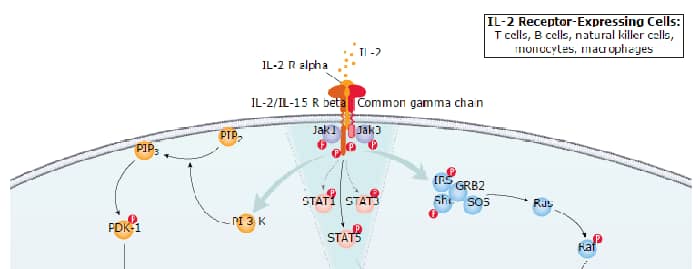Human IL-2 QuantiGlo ELISA Kit Summary
Sample Type & Volume Required Per Well
Cell Culture Supernates (100 uL), Serum (100 uL), EDTA Plasma (100 uL), Heparin Plasma (100 uL)
Assay Range
1.7 - 1,250 pg/mL (Cell Culture Supernates, Serum, EDTA Plasma, Heparin Plasma)
Specificity
Natural and recombinant human IL-2
Cross-reactivity
< 0.5% cross-reactivity observed with available related molecules.< 50% cross-species reactivity observed with species tested.
Interference
No significant interference observed with available related molecules.
Product Summary
The QuantiGlo Human IL-2 Chemiluminescent Immunoassay is a 5.5 hour solid phase ELISA designed to measure IL-2 levels in cell culture supernates, serum, and plasma. It contains E. coli-expressed recombinant human IL-2 and antibodies raised against the recombinant factor. It has been shown to accurately quantitate recombinant human IL-2. Results obtained using natural human IL-2 showed linear curves that were parallel to the standard curves obtained using the recombinant QuantiGlo kit standards. These results indicate that this kit can be used to determine relative mass values for natural human IL-2.
Precision
Intra-Assay Precision (Precision within an assay) Three samples of known concentration were tested on one plate to assess intra-assay precision
Inter-Assay Precision (Precision between assays) Three samples of known concentration were tested in separate assays to assess inter-assay precision
Cell Culture Supernates, Serum, EDTA Plasma, Heparin Plasma
|
Intra-Assay Precision |
Inter-Assay Precision |
| Sample |
1 |
2 |
3 |
1 |
2 |
3 |
| n |
20 |
20 |
20 |
20 |
20 |
20 |
| Mean (pg/mL) |
5.8 |
175 |
884 |
5.9 |
165 |
795 |
| Standard Deviation |
0.19 |
5.6 |
23 |
0.46 |
11 |
59 |
| CV% |
3.3 |
3.2 |
2.6 |
7.8 |
6.7 |
7.4 |
Recovery
The recovery of IL-2 spiked to three different levels throughout the range of the assay was evaluated.
| Sample Type |
Average % Recovery |
Range % |
| Cell Culture Media (n=4) |
102 |
99-105 |
| EDTA Plasma (n=4) |
97 |
95-100 |
| Heparin Plasma (n=4) |
97 |
94-104 |
| Serum (n=4) |
98 |
96-101 |
Linearity
To assess the linearity of the assay, four samples containing or spiked with high concentrations of IL-2 in various matrices were diluted with the Calibrator Diluent to produce samples with values within the dynamic range of the assay.
Scientific Data
Human IL-2 Chemiluminescent ELISA Standard Curve
Product Datasheets
You must select a language.
x
Preparation and Storage
Shipping
The product is shipped at ambient temperature. Upon receipt, store it immediately at the temperature recommended below.
Storage
Store the unopened product at 2 - 8 °C. Do not use past expiration date.
Background: IL-2
Interleukin 2 (IL-2), also known as T cell growth factor (TCGF), is a 15-18 kDa variably glycosylated alpha -helical polypeptide that is a member of the Common gamma Chain ( gamma c) cytokine family (1-4). It exists as a monomer and has a notably short half-life (< 30 minutes) (1). Human IL-2 is synthesized as a 153 amino acid (aa) precursor that contains a 20 aa signal sequence plus a 133 aa mature region (5, 6). The mature region is alpha -helical in nature, and contains one utilized O-linked glycosylation site at Thr3 plus three cysteines, two of which form an intrachain disulfide bond that is essential for activity (7). Mature human IL-2 shares 73%, 66%, 78% and 97% aa identity with canine, rat, feline and rhesus monkey IL-2, respectively. Although human IL-2 shares only approximately 60% aa identity with the highly polymorphic mouse IL-2, human IL-2 is known to be active on mouse IL-2 responsive cells. Cells reported to secrete IL-2 include gamma δ T cells (8), activated conventional CD4+ and CD8+ T cells (1, 9), neurons (10, 11), microglia (12), and hematopoietic stem cells (13).
The receptor for IL-2 (IL-2 R) is composed of three subunits, the 55 kDa CD25/IL-2 R alpha chain, the 70 kDa IL-2 R beta chain, and the 65 kDa Common gamma Chain (1, 3). IL-2 first binds to CD25, the binary complex then recruits IL-2 R beta and gamma c to form the quaternary signaling complex (1, 14). In addition to IL-2, IL-2 R beta is used by IL-15 in its quaternary signaling complex. gamma c also serves as a signaling receptor for IL-4, -7, -9, -15, and -21 (1, 3).
In vitro studies have shown an important role for IL-2 in T cell activation and expansion. In vivo, IL-2 is critical for the development, maintenance and function of regulatory T cells (Treg) which provide protection against autoimmune disease. On the other hand, IL-2 can also promote autoimmune inflammation in target organs through its roles in regulating the expression of T cell trafficking genes, and production of Th2 cytokines. Within the CD8+ T cell subset, IL-2 is essential for optimal primary responses and differentiation into terminal effector cells. IL-2 also promotes the development of activated CD8+ T cells into memory cells. (1).
Entrez Gene IDs:
3558 (Human); 16183 (Mouse); 116562 (Rat); 396868 (Porcine); 280822 (Bovine); 403989 (Canine); 100034204 (Equine); 751114 (Feline); 100302458 (Rabbit)
Alternate Names:
Aldesleukin; IL2; IL-2; IL-2lymphokine; interleukin 2; interleukin-2; involved in regulation of T-cell clonal expansion; Proleukin; T cell growth factor; T-cell growth factor; TCGF













